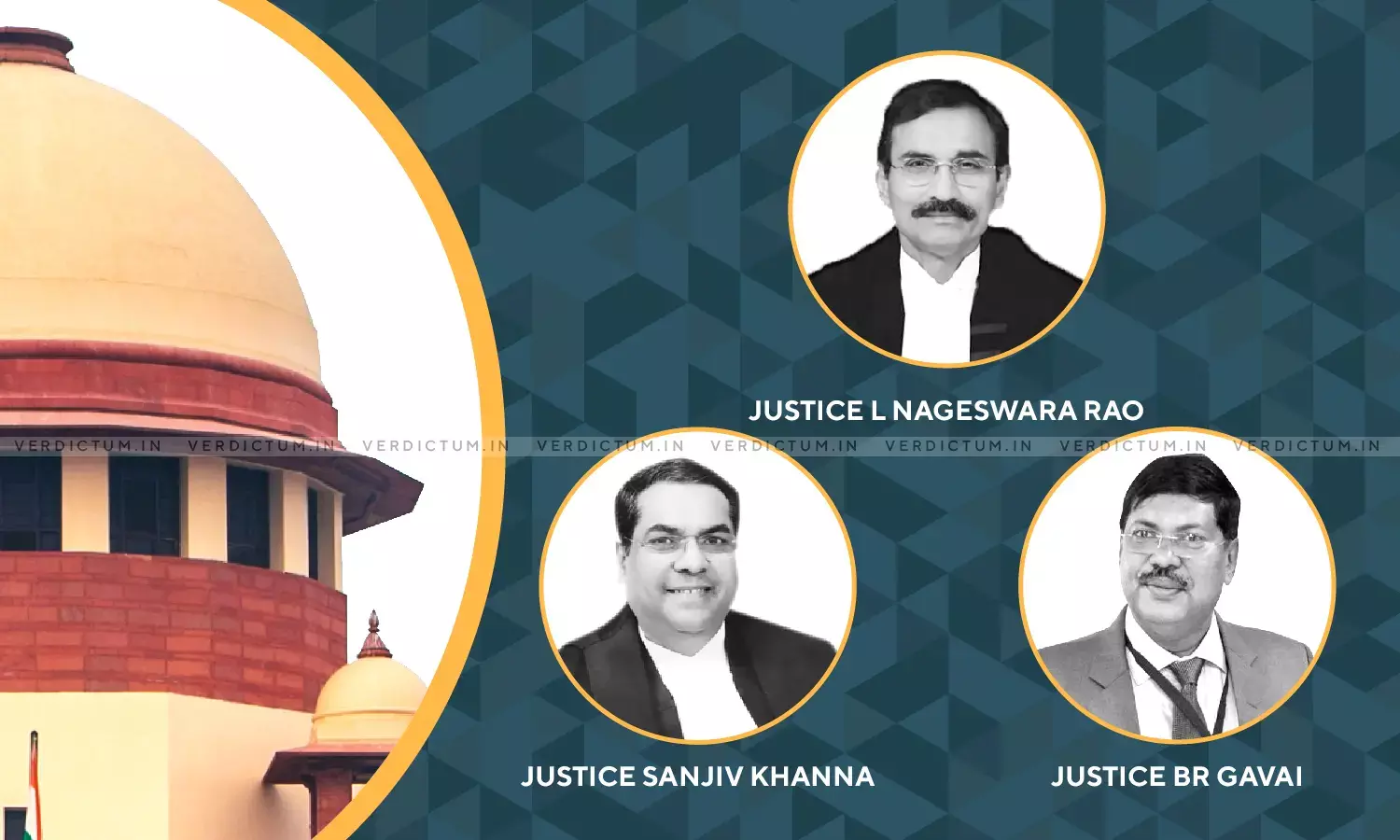Appointment Made As Per Draft UPSC Guidelines And Judgment In Prakash Singh's Case– SC While Upholding Appointment Of Punjab DGP

A three-judge Bench of Justice L Nageswara Rao, Justice Sanjiv Khanna and Justice BR Gavai has upheld the appointment of Mr. Dinkar Gupta as the Director-General of Police for the State of Punjab.
The Court rejected the contention of the Appellant that the criteria fixed by the Apex Court in Prakash Singh v. Union of India (2006 8 SCC 1) were not followed in letter and spirit by the Empanelment Committee of UPSC while conducting selection to the post of DGP.
Senior Advocate Mr. Krishnan Venugopal and Senior Advocate Mr. PS Patwalia appeared for the Appellants, while Additional Solicitor General of India Mr. Aman Lekhi appeared for Respondent No. 1 (UPSC), Senior Advocate Mr. Mukul Rohatgi appeared for the State of Punjab, Senior Advocate Mr. Maninder Singh appeared for Respondent No. 4 and Senior Advocate Mr. Shyam Divan appeared for Respondent No. 5 during the proceedings before the Court.
Further, the Bench observed, "In the instant case, Empanelment Committee decided to assess the range of experience of officers to head the police force in the State of Punjab after considering the peculiarities of the State. Identification of five core policing areas out of a domain of twenty policing areas cannot be said to be an arbitrary exercise of power."
Appeals were preferred before the Supreme Court assailing the judgment of Punjab and Haryana High Court which had reversed the findings of the Central Administrative Tribunal (CAT) and upheld the appointment of Respondent 4 (Dinkar Gupta) as DGP of Punjab. The Court had rejected the conclusion of the Tribunal that the Draft Guidelines lacked authenticity, by holding that they were approved by the Apex Court.
Further, the Court also upheld the jurisdiction of UPSC in formulating Draft Guidelines and giving discretion to the Empanelment Committee to follow its own procedure. The Court also approved the five policing areas identified by UPSC for assessment of officers from the State of Punjab.
The High Court had also held that the Tribunal encroached into the domain of the experts in setting aside the selection made by UPSC. The Court was in agreement with the Tribunal that the Appellant failed to make out a case of bias.
The issue which was dealt with by the Supreme Court was whether the selection and appointment of Respondent No.4 as DGP (HoPF) on the basis of the Draft Guidelines was contrary to the judgment of this Court in Prakash Singh's case, suffered from the vice of irrationality and was vitiated due to malice and bias.
The Apex Court referred to the Draft Guidelines and observed the following –
i) Selection, according to the Guidelines, shall be merit-based and inclusion in the panel shall be adjudged on the basis of 'very good' record and range of experience for heading the police force.
ii) The Draft Guidelines empowered the Committee to adopt its own methods and procedure for objective assessment of the suitability of officers to the zone of consideration.
iii) Only those officers assessed by the Committee as at least 'very good for each of the preceding 10 years shall be considered for inclusion in the panel.
iv) The Committee shall also take into account the range of experience, relevant for heading the police force as reflected in the bio-data of the officers for determining their suitability for inclusion in the panel
v) The Guidelines stipulated that the State Government shall appoint DGP from amongst the three senior-most officers included in the panel.
The Court while upholding the selection criteria adopted by UPSC to appoint the DGP opined, "Considering the peculiar situation of the State of Punjab, intelligence, law and order, administration, investigation and security were identified as the core policing areas to ascertain range of experience of an officer to head the police force."
"The Draft Guidelines cannot be said to be contrary to the criteria laid down by this Court in Prakash Singh's case. The preparation of a panel on the basis of the Draft Guidelines after taking into account the core policing areas cannot be said to be arbitrary," the Bench observed.
The Court also rejected the contention of the Appellants that the core policing areas were identified only to suit Respondent No. 4.
Additionally, the Bench asserted, "The Tribunal committed an error in recording the finding that the Empanelment Committee deviated from the procedure prescribed by this Court in Prakash Singh's case. There is no basis for the conclusion of the Tribunal that the Draft Guidelines are contrary to the directions given by this Court in Prakash Singh's case."
"The Tribunal committed an error in holding the decision of the Committee as arbitrary in the absence of reasons. Therefore, the preparation of the panel by the Empanelment Committee cannot be said to be suffering from unreasonableness," the Court held.
The argument of the Appellants that the decision of the Committee was vitiated on account of the presence of Respondent No. 5 due to the principle of bias, was rejected on the ground that the Appellant did not challenge the constitution of the Committee prior to the rejection of his candidacy. The Bench referred to several of its earlier judgments on the subject to arrive at that conclusion.
Furthermore, the Court rejected the argument that the Appellant was not aware of the constitution of the Committee, in order to challenge the same.
The Court held, "Notwithstanding the awareness and knowledge, the petitioner did not object, which indicates that he was satisfied that the member had nothing against him. Therefore, belated plea taken by the petitioner did not merit acceptance and mitigates against bona fides of the objection to the appointment of the person as a member of the committee".
In the light of these observations, the Court upheld the judgment of the High Court and upheld the appointment and selection of Respondent No. 4 as DGP, State of Punjab.
Click here to read/download the Judgment

